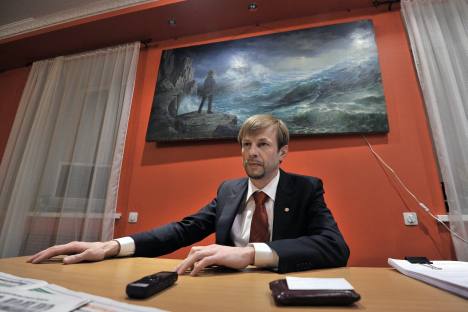
Opposition attracts: Yevgeny Urlashov won the mayoral race in Yaroslavl in fine style. Source: Kommersant
In Yaroslavl,
a city of more than half a million people situated about 150 miles outside Moscow, an independent
candidate dominated the mayoral election held last month. Yevgeny Urlashov, a
veteran of Yaroslavl
city council, ran on an anti-corruption platform with support from a broad
spectrum of opposition parties – and won 70 percent of the vote.
Observers say that the result
highlights two growing trends in Russia: modest victories for the
opposition in regional elections; and a critical loss of trust in the ruling
United Russia party.
Even before the results came in, there was a sense that Urlashov’s campaign had
found the momentum needed to carry him to victory. Local opposition parties,
including the Communists, Just Russia
and Yabloko, united behind the former United Russia city councilor. More than
1,000 election monitors travelled to Yaroslavl
from Moscow, St Petersburg and other cities to prevent
ballot stuffing and other methods of voter fraud, a sign of the growing
political activism among rank-and-file Russians. “The road to the Kremlin goes
through Yaroslavl,”
wrote the Democratic Choice movement leader Vladimir Milov in a blog posted
before the poll.
As opposition protests in Moscow
started to run out of steam, a campaign for civic participation gradually took
its place. Activist Boris Akunin proclaimed: “The civic movement has entered a
new phase. The first phase, romantic and euphoric, is over.” He argued that the
opposition should gather power from the ground up.
Opposition parties in other areas also
won modest victories in the March elections. Several young opposition
candidates, supported by the “Our City” initiative (a movement encouraging
normally apolitical individuals to stand against United Russia in district
councils), won seats as city councilors in Moscow.
United Russia candidates
also lost mayoral battles in two high-profile locations, Chernogolovka and Tolyatti. The city of Tolyatti
is the home of Russia’s
AvtoVAZ carmaker and a recipient of Kremlin largesse. Despite billions in
bailout funds to AvtoVAZ, Sergei Andreyev, an independent candidate, won 56 percent
of the votes, which was seen as a referendum against the ruling party.
Considering that in the UK
only four of the 14 directly elected mayors are independent, the success of the
three Russian independent mayors is a very significant victory.
Russian elections: same players – different numbers
A self-promoted candidate won municipal elections
Starting non-parliamentary dialogue
Opinion: United Russia fails to win 50 percent in State Duma elections
In the run-up to the election, Yaroslavl
was shaken in September by the loss of its Lokomotiv ice hockey team in a plane
crash. While local investigators said pilot error was behind the disaster, Urlashov disagreed, quitting United Russia in the process. By the time of
December’s parliamentary vote, anti-United Russia
sentiment was at its peak in Yaroslavl.
United Russia won only 29 percent
of the vote there, the party’s worst showing in any of Russia’s 83
regions.
In an interview with Izvestia , Urlashov accused his United Russia opponent
Yakov Yakushev of running a dirty campaign, in what he called an “attempt to
seize power”. The result of the election was, he said, “only unexpected for
someone who doesn’t live in Yaroslavl”.
United Russia
has increasingly been seen as “a party of crooks and thieves”, the name given
it by corruption whistleblower and opposition leader Alexei Navalny. Because of
this public perception, some United Russia party members say the party must
change its image.
Political analyst Alexei Mukhin said rebranding was crucial for the success of
future elections and that the party would need to “change its name, conduct a
deep, internal rebranding and change its leadership.” Mr Mukhin also suggested
that United Russia should pick new faces from the professional classes in the
regions in order to stave off future losses in local, or even federal, elections.
Sergei Neverov, the head of United Russia’s general council, warned that Yaroslavl residents would
“regret their decision” in the mayoral elections. And, indeed, Urlashov will
have his work cut out: local politics in Yaroslavl’s
city council are dominated by United Russia, and the regional governor
supported Mr Urlashov’s opponent in the election.
Mr Urlashov has flatly
rejected
returning to United Russia in order to garner
political support, but he told Izvestia newspaper that he
was ready to work with local politicians as “institutions of government”.
“I will work with them in a business-like manner, fruitfully and constructively,” he added.
First published in Russia Profile. Read the original article here.
All rights reserved by Rossiyskaya Gazeta.
Subscribe
to our newsletter!
Get the week's best stories straight to your inbox